Boucher Surname Ancestry ResultsOur indexes 1000-1999 include entries for the spelling 'boucher'. In the period you have requested, we have the following 529 records (displaying 1 to 10): Single Surname Subscription | | | Buying all 529 results of this search individually would cost £2,866.00. But you can have free access to all 529 records for a year, to view, to save and print, for £100. Save £2,766.00. More... |
These sample scans are from the original record. You will get scans of the full pages or articles where the surname you searched for has been found. Your web browser may prevent the sample windows from opening; in this case please change your browser settings to allow pop-up windows from this site. Grantees of offices, commissions and pardons
(1350-1354)
The Patent Rolls are the Chancery enrolments of royal letters patent. Those for the 24th to the 27th years of the reign of king Edward III (25 January 1350 to 24 January 1354) were edited for the Public Record Office by R. F. Isaacson, and published in 1907. The main contents are royal commissions and grants; ratifications of ecclesiastical estates; writs of aid to royal servants and purveyors; and pardons. BOUCHER. Cost: £2.00.  | Sample scan, click to enlarge

| Fine Rolls
(1356-1368)
The close rolls of the 30th to 42nd years of the reign of king Edward III record part of the government administration in England, with orders sent out day by day to individual officers, and commitment of particular responsibilities and duties. There is also some material relating to Wales, Scotland, Ireland and the English possessions in France. BOUCHER. Cost: £4.00.  | Sample scan, click to enlarge

| Inhabitants of London
(1352-1374)
Letter Book G of the City of London contains enrolments of recognizances between inhabitants, particularly citizens, for sums of money lent or due; grants of pieces of land or property; and various records relating to the city administration.
BOUCHER. Cost: £4.00.  | Sample scan, click to enlarge
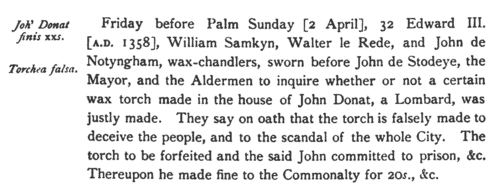
| Norman Rolls
(1200-1417)
The dukedom of Normandy is one of the appendages of the English crown, but actual possession of the dukedom was actively contested by the kings of France. During the periods of English power records were kept for Normandy similar to those of the royal administration in England, with enrolment of letters and grants of liberties and privileges and confirmations of previous enjoyed rights. The rolls for 1200 to 1205 and during the reassertion of English rule under Henry V in 1417, were edited by Thomas Duffus Hardy for the Commissioners of the Public Records, and published in 1835. Most of the persons mentioned are French inhabitants of Normandy or Englishmen in France, but there is also a long section (from page 122 onwards) of valuation of lands of Normans in England, where English jurors, county by English county, attest to acreage, numbers of cattle &c.BOUCHER. Cost: £4.00.  | Sample scan, click to enlarge

| The English in France
(1423)
King Henry VI of England (one of the grandsons of Charles VI of France) claimed the throne of France (and quartered the fleurs-de-lis of France with the lions of England on the royal standard) as had his predecessors since Edward III, as descendants of Philip IV of France. The English had real power or influence in Brittany, Normandy, Flanders and Gascony, and actual possession of several coastal garrisons, in particular Calais, where the French inhabitants had been replaced by English. Henry VI came to the throne only seven years after his father had trounced the French at Agincourt; but his cousin, Charles VII, who became king of France in the same year, spent his long reign rebutting the English king's claim to his throne by territorial reconquest and consolidation. The English administration kept a series of records called the French Rolls. On these are recorded royal appointments and commissions in France; letters of protection and safe-conduct to soldiers, merchants, diplomats and pilgrims travelling to France from England and returning, and to foreign legations. There are also licences to merchants to export to the Continent, and to captains to transport pilgrims. As Henry VI's reign progressed, and the English grip on northern France loosened, the French Rolls also increasingly include entries concerning the ransoming of English prisoners.BOUCHER. Cost: £6.00.  | Sample scan, click to enlarge
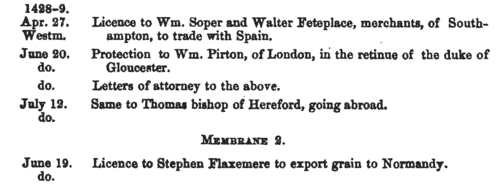
| The English in France
(1424)
King Henry VI of England (one of the grandsons of Charles VI of France) claimed the throne of France (and quartered the fleurs-de-lis of France with the lions of England on the royal standard) as had his predecessors since Edward III, as descendants of Philip IV of France. The English had real power or influence in Brittany, Normandy, Flanders and Gascony, and actual possession of several coastal garrisons, in particular Calais, where the French inhabitants had been replaced by English. Henry VI came to the throne only seven years after his father had trounced the French at Agincourt; but his cousin, Charles VII, who became king of France in the same year, spent his long reign rebutting the English king's claim to his throne by territorial reconquest and consolidation. The English administration kept a series of records called the French Rolls. On these are recorded royal appointments and commissions in France; letters of protection and safe-conduct to soldiers, merchants, diplomats and pilgrims travelling to France from England and returning, and to foreign legations. There are also licences to merchants to export to the Continent, and to captains to transport pilgrims. As Henry VI's reign progressed, and the English grip on northern France loosened, the French Rolls also increasingly include entries concerning the ransoming of English prisoners.BOUCHER. Cost: £6.00.  | Sample scan, click to enlarge
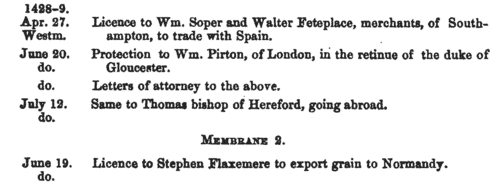
| The English in France
(1432)
King Henry VI of England (one of the grandsons of Charles VI of France) claimed the throne of France (and quartered the fleurs-de-lis of France with the lions of England on the royal standard) as had his predecessors since Edward III, as descendants of Philip IV of France. The English had real power or influence in Brittany, Normandy, Flanders and Gascony, and actual possession of several coastal garrisons, in particular Calais, where the French inhabitants had been replaced by English. Henry VI came to the throne only seven years after his father had trounced the French at Agincourt; but his cousin, Charles VII, who became king of France in the same year, spent his long reign rebutting the English king's claim to his throne by territorial reconquest and consolidation. The English administration kept a series of records called the French Rolls. On these are recorded royal appointments and commissions in France; letters of protection and safe-conduct to soldiers, merchants, diplomats and pilgrims travelling to France from England and returning, and to foreign legations. There are also licences to merchants to export to the Continent, and to captains to transport pilgrims. As Henry VI's reign progressed, and the English grip on northern France loosened, the French Rolls also increasingly include entries concerning the ransoming of English prisoners.BOUCHER. Cost: £6.00.  | Sample scan, click to enlarge
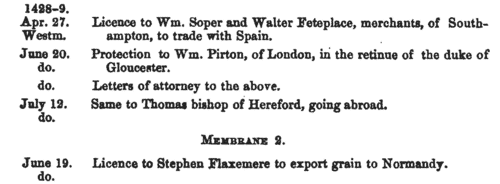
| Clerks, clergy, benefactors and tenants of the Hospital of St Nicholas, Salisbury
(1214-1439)
Christopher Wordsworth, Master of the Hospital of St Nicholas in Salisbury, Wiltshire, published an edition of the 15th-century cartulary of that foundation in 1902. While transcribing the text, he interspersed it with notes and lists from his own researches so as to provide a general history of the hospital, and some of the material dates from much later than 1500, and relates to those institutions which he regarded as daughter institutions or offshoots of the hospital. There are later additions to the cartulary through to 1639, and records of the Chapel of St John Baptist on the Isle, the Scotist College of St Nicholas de Vaux (Valle Scholarium), and the collegiate church of St Edmund, Salisbury. There is also a calendar of records belonging to the hospital. The cartulary itself is a quarto codex of 80 leaves, copying charters of bequests to the hospital, and in these the main persons to appear are the benefactors, the witnesses, and occasionally the names of tenants, occupiers of adjoining tenements, and members of the hospital clergy. The cartulary is in six geographical sections: I, Box, Wyvelesford and Manningford Bohun; II, Broad Hinton; III, Fyssherton (Fisherton Aucher or Anger); IV, East and West Harnham; V, Salisbury; and VI, Gerardeston (Gurston in Broadchalke).BOUCHER. Cost: £4.00.  | Sample scan, click to enlarge
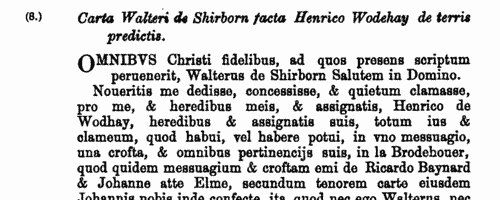
| Close Rolls
(1441-1447)
The close rolls of the 20th to 25th years of the reign of king Henry VI record the main artery of government administration in England, the orders sent out day by day to individual officers, especially sheriffs of shires: they are an exceptionally rich source for so early a period. There is also some material relating to Wales, Scotland, Ireland and the English possessions in France. BOUCHER. Cost: £4.00.  | Sample scan, click to enlarge

| Close Rolls
(1447-1454)
The close rolls of the 26th to 32nd years of the reign of king Henry VI record the main artery of government administration in England, the orders sent out day by day to individual officers, especially sheriffs of shires: they are an exceptionally rich source for so early a period. There is also some material relating to Wales, Scotland, Ireland and the English possessions in France. BOUCHER. Cost: £4.00.  | Sample scan, click to enlarge

|
Research your ancestry, family history, genealogy and one-name study by direct access to original records and archives indexed by surname.
|












